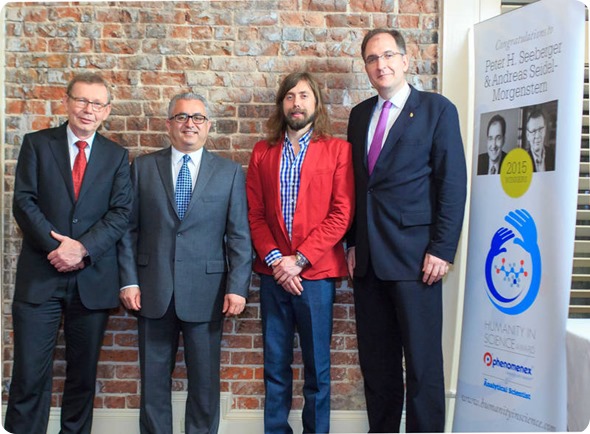Professor Peter H. Seeberger, Professor Andreas Seidel-Morgenstern and their team are successful in producing a low-cost but highly effective medication for malaria from plant waste material. For their findings, they received the $25,000 award “Humanity in Science” during Pittcon 2015 in New Orleans.
The submission from Germany was successful against 85 further applications from around the world. "We were all overwhelmed by the quality of the entries received for the Humanity in Science Award", said Rich Whitworth, Editor of "The Analytical Scientist", who has established the Award in cooperation with Phenomenex.
The judging process was no easy task. I truly hope that this annual award serves its singular purpose – to shine the spotlight on the great work of analytical scientists around the world.
Peter H. Seeberger, director at the Max-Planck Institute for Colloids and Surfaces in Potsdam and Professor at the Free University of Berlin, and Andreas Seidel-Morgenstern, Director at the Max Planck Institute for Dynamics of Complex Technical Systems, where he is head of the ‘Physical and Chemical Foundations of Process Engineering’ group, and professor of Chemical Process Engineering at the Otto von Guericke University in Magdeburg, received the award for their essay titled "Continuous Flow Production and Purification of Malaria Medications" during the World's Largest Annual Conference and Exposition for Laboratory Science, Pittcon 2015 in New Orleans.

Andreas Seidel-Morgenstern (left) and Peter H. Seeberger (right) received the prize from Alex Gharagozlow, Phenomenex, and Rich Whitworth, TAS
Professor Peter H. Seeberger, Professor Andreas Seidel-Morgenstern and their team are successful in producing a low-cost but highly effective medication for malaria from plant waste material. For their findings, they received the $25,000 award “Humanity in Science” during Pittcon 2015 in New Orleans.
The World Health Organization (WHO) recommends artemisinin as the most effective base material for medication against malaria. The two scientists produced artemisinin in a continuous process in a very short time and very high yield. This process can substantially reduce the price for the production of effective anti- malaria drugs and can make the combat against malaria affordable for people in need. The scientists have been using, among others, KNAUER technology for their processes.
"This recognition of our work by an international jury of leading scientists encourages me to continue our work on translating our scientific breakthrough into a production facility", Seeberger said.
This process is just one example of the power of continuous processes that will revolutionize the production of life-saving medications in developing countries.
Further information
Humanity in Science Award website: www.humanityinscienceaward.com
Max Planck Institute for dynamics of complex technical systems Magdeburg website: www.mpi-magdeburg.mpg.de/2899741/2015-03-11_Humanity_in_Science_Seidel_Morgenstern